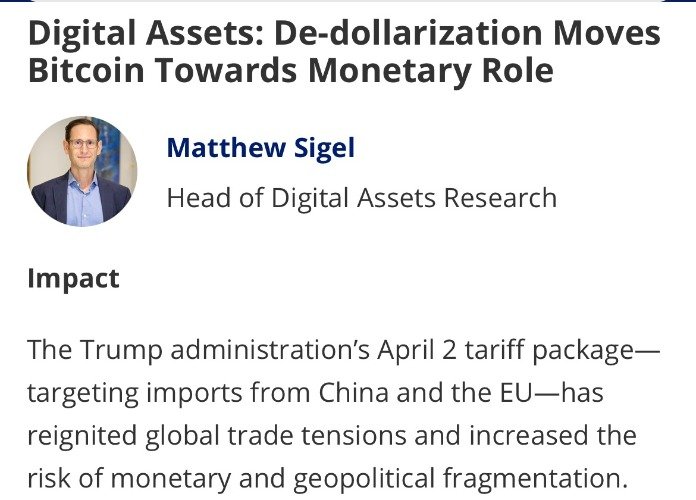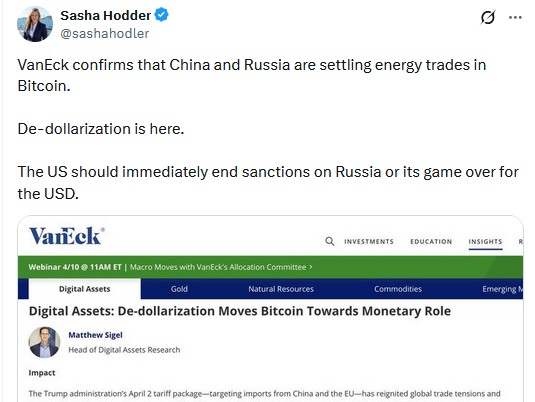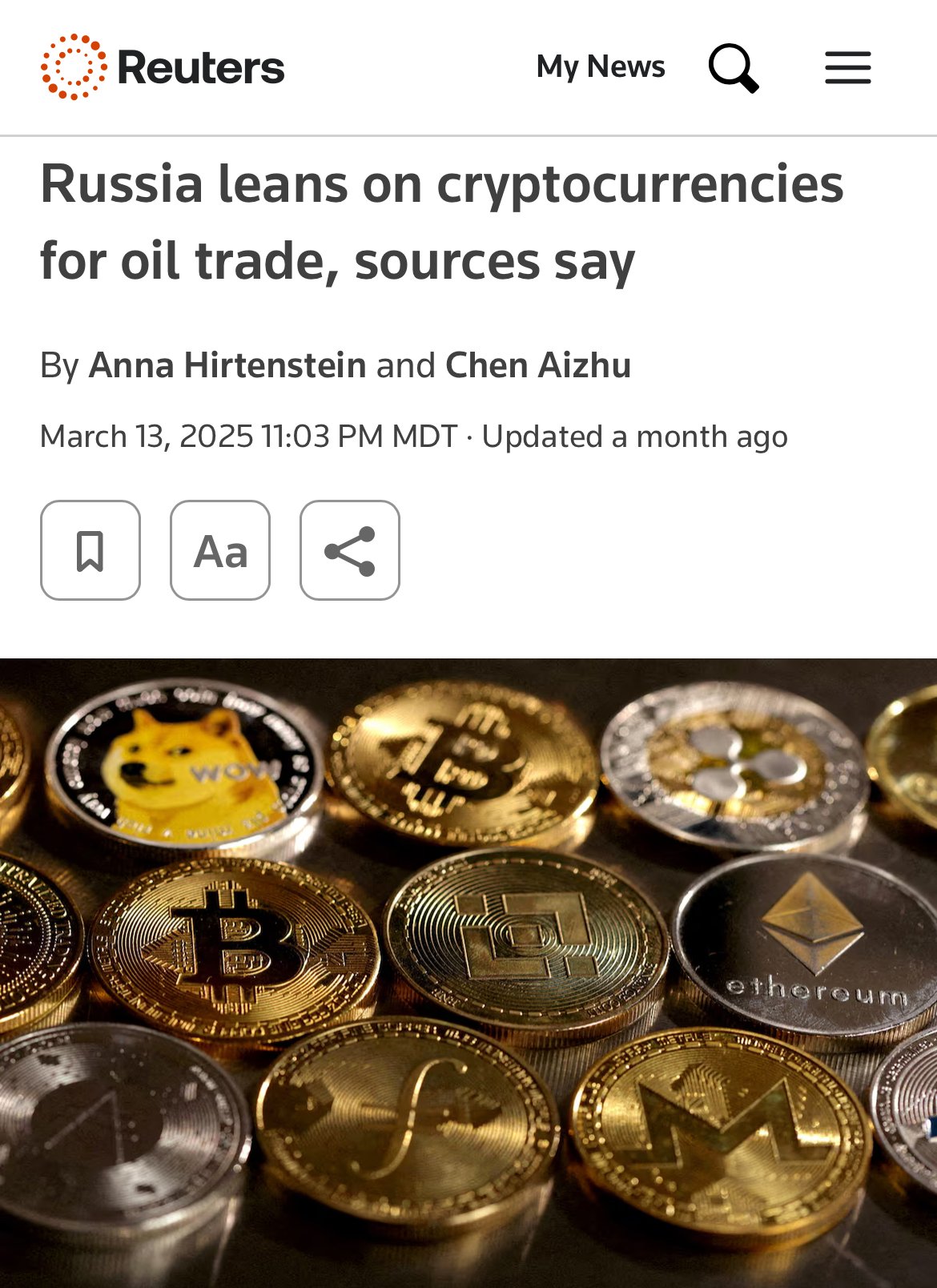“De-dollarization is here.”
Founder and Principal Attorney Sasha Hodder of Hodder Law, a firm specializing in cryptocurrency-related business law founded in 2022, commented on the implications of the Trump administration’s (now paused) tariffs to the U.S. dollar, as highlighted in an article released Wednesday by asset manager, VanEck.

The article, “Digital Assets: De-dollarization Moves Bitcoin Towards Monetary Role,” was one in a series released Tuesday by VanEck from their portfolio managers being tasked with providing “insights” on the multiple current impacts of the tariffs.
VanEck, founded in 1955, claiming an assets under management (AUM) figure of $113.8 billion, as of December 31, 2024, is described by their website’s “About” section as:
“… one of the first U.S. asset managers to offer investors access to international markets, and recognized early the transformative potential of gold investing, ETFs and digital assets.”
The insight piece, penned by Van Eck’s U.S. Head of Digital Assets Research, Matthew Sigel, points to bitcoin as the solution for nations seeking forms of trade settlement independent of the U.S. dollar, stating,
“… the weaponization of trade and financial infrastructure continues to drive interest in neutral settlement rails. …
“China and Russia have reportedly begun settling some energy transactions in Bitcoin and other digital assets.
“Bolivia has announced plans to import electricity using crypto. And French energy utility EDF is exploring whether it can mine Bitcoin with surplus electricity currently exported to Germany.
“These are early signs that Bitcoin is evolving from a speculative asset into a functional monetary tool—particularly in economies looking to bypass the dollar and reduce exposure to U.S.-led financial systems.”
No stranger to informally expressing what might fairly be called her “professional expert opinions,” Hodder’s Wednesday X post, which received over 3,000 likes and over 600 reposts in under five hours, said succinctly,
“VanEck confirms that China and Russia are settling energy trades in Bitcoin. De-dollarization is here. The US should immediately end sanctions on Russia or its game over for the USD.”

Hodder is highly endorsed on the firm’s website by many industry experts, including Exodus (wallet) Movement CEO JP Richardson.
According to her LinkedIn profile, Hodder serves as senior counsel for Exodus.
While a full-time practicing attorney, she additionally posts industry updates on navigating digital assets regulations on YouTube as well as X.
Expounding for Bitcoin News readers via direct message about her use of the phrase “game over for the USD,” Hodder clarified:
“If China and Russia can settle energy trades in bitcoin, the U.S. dollar loses its most important function, being the global reserve and settlement currency. It’s not an overnight collapse, but it’s the beginning of the end of the dollar’s dominance over global trade.”
The same screenshot of the Sigel opinion piece gained further traction within the bitcoin community, being also re-posted by “Coin Stories” host Natalie Brunnell.
On her thread, one X user, “dkirk,” called into question “what source he (Sigel)’s citing” on bitcoin settlement for energy trade between Russian and China.
On Sigel’s feed, user Ricky Rom likewise demanded to know:
“‘reportedly’” … Reported by whom and where?“
Response came quickly from Sigel, self-described on his X account, which boasts over 40,000 followers, as a “recovering CFA” — a chartered financial analyst, a title recognized worldwide, according to Investopedia.
Sigel replied, perhaps with a sigh, by citing three recent news links, and saying,
“I don’t know why this is so difficult.”
Two of the links he provided were from well-known news agency Rueters, describing the worldwide scenario unfolding:
“Russia leans on cryptocurrencies for oil trade, sources say” and “Bolivia turns to crypto for energy imports amid dollar, fuel shortages.”
Sigel’s third provided news link was to The Big Whale, reporting with the headline “The French government opens the door to Bitcoin mining by EDF.” According to the article, EDF is a state-owned “energy giant.”
Commenting in Sigel’s feed, Russian user Brian McDonald summed up the situation, saying,
“VanEck calls it the first real step toward a parallel system—beyond SWIFT, beyond sanctions, beyond the dollar.”
Bitcoin News reported on the developing multinational exit from the petrodollar dependence, likewise featuring VanEck’s Sigel, in October 2024’s “BRICS Nations Eye Bitcoin to Break Free from the U.S. Dollar: VanEck.”
The BRICS alliance of formerly five nations – Brazil, Russia, India, China and South Africa – now includes at least 10 countries, representing about 45% of the world’s population, The Associated Press reported in January.
(More: This author published a December 2024 column titled “World War Bitcoin,” detailing more about BRICS and the apparent “arms race” among nations to accumulate bitcoin.)
Even prior to U.S. elections and the bitcoin-industry friendly promises, now policies, of President Trump’s administration, Sigel cited that countries including Argentina, Ethiopia and the United Arab Emirates were mining bitcoin, as Bitcoin News stated in the Fall …
“to create additional sources of revenue and, perhaps more importantly, establish alternatives to the U.S. dollar in international trade,”
… as well as:
“This shift is part of a broader strategy among emerging economies to reduce their reliance on the dollar, which has long been the dominant currency in global trade.”
Continuing discussion on Hodder’s feed brought up T-bills and stablecoins.
Hodder expressed her belief in bitcoin’s presumed future dominant role in world finances, referencing the Trump administration’s recent stablecoin act – “… To Reinforce U.S. Dollar Dominance,” according to a March 27 Forbes headline.
Hodder posited that with Tether, stablecoins would likely “… prop up the dollar for the next few years till it breaks.”
Sigel’s recent report echoed the sentiment of Hodder, as well as the BRICS nations, stating that, “Bitcoin is evolving from a speculative asset into a functional monetary tool — particularly in economies looking to bypass the dollar and reduce exposure to U.S.-led financial systems.”


